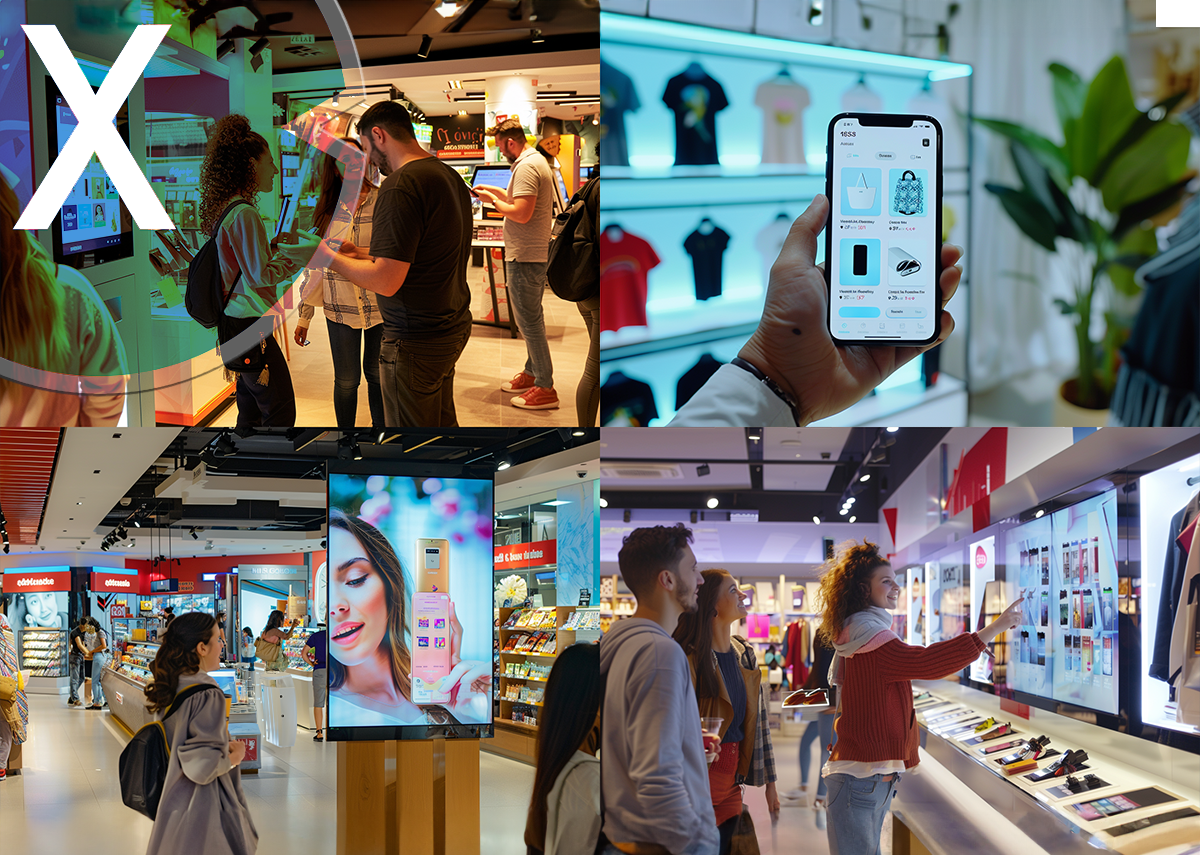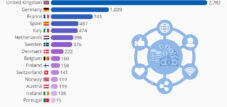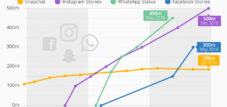Digitization | The digital trends in retail marketing: AI, personalization, retail media, retail apps and social commerce
Language selection 📢
Published on: June 16, 2024 / update from: June 21, 2024 - Author: Konrad Wolfenstein

AI, personalization, retail media, retail apps and social commerce are changing the shopping experience: A look into the future of customer-oriented technologies - Image: Xpert.Digital
📈✨ Transformation in commercial marketing: The future is digital
📈🔍 Marketing 2.0 in retail: Adaptation strategies for the digital future
Digital marketing in retail experiences an unprecedented development. In view of the rapid technical developments and changing consumer behavior, marketing managers are continuously facing the challenge of adapting their strategies to remain competitive. A look at the KPMG Retail Sales Monitor 2/2024 reveals the crucial digital trends that are currently shaping commercial marketing and will form in the future.
🔍🎯 Personalization: The key to success
The top priority is personalization. 77 percent of the marketing managers consider them the key to success. Nowadays, consumers expect an individual approach that reflects their needs and preferences. Companies that are able to deliver relevant content and thus offer a tailor -made shopping experience have a significant advantage over the competition. Personalization goes beyond the mere response with the name. It is about making the shopping experience at every level of customer contact-from advertising to product presentation to the after-sales service-personally and relevant.
🤖✨ Artificial intelligence: The Game Changer
Another trend that has the potential to fundamentally change the commercial marketing is artificial intelligence (AI). Eight out of ten marketing managers see a future game changer in her. The use of AI makes it possible to analyze large amounts of data and to make it precisely predicted. This can be used, for example, to better understand consumer behavior, pronounce personalized recommendations or to design more efficient advertising campaigns. AI-supported chatbots, which are customers: look after around the clock, are just an example of the diverse possible uses of technology in commercial marketing.
💼📊 Retail Media: A new source of income
Retail Media represents a new, margin source for dealers and at the same time opens up the opportunity to advertise products in line with the target group. This is about advertising platforms that are operated by individual dealers themselves in order to offer brands the opportunity to advertise directly in their sphere of influence. This fits seamlessly into the online shopping environment and enables a very direct and effective customer approach. The relevance of Retail Media is particularly underlined by the possibility of gaining detailed insights into the buying behavior and preferences of the target group.
📱📲 Digitization of advertising materials: paper brochures adé
The digitization of the classic paper prospectus by own trading apps is seen by more than three quarters of the dealer as a significant alternative. This development shows how digital solutions displace traditional marketing instruments and at the same time open up new opportunities for interaction and customer loyalty. Apps not only make it possible to present current offers comprehensive and environmentally friendly, but also to enrich the shopping experience with functions such as augmented reality or personalized discounts.
🛍️📣 Social Commerce: Trust through social networks
Finally, social commerce complements the portfolio of digital marketing strategies with an important component. Compared to classic e-commerce, the sale via social networks offers significant advantages with regard to trust formation in the dealer. By directly integrating the purchase options in social media, brands can build authentic relationships with their target group and gain the trust of potential buyers through influencer marketing or user -generated content. Social Commerce makes it possible to present products in a natural and trustworthy context, which can significantly increase the willingness to buy.
🚀📊 The new pillars of commercial marketing
These developments illustrate that commercial marketing is in a phase of profound changes. Personalization, AI use, retail media, digitization of advertising materials and social commerce are much more than mere trends. They are the pillars of a new marketing landscape in retail, which is shaped by an increasingly digital world. Companies that recognize this change and are ready to invest in these technologies and strategies will not only have successes at short notice, but will also secure a strong position in the market in the long term.
💡 The change in the consumer brand relationship
Overall, these developments reflect a fundamental shift in the relationship between consumers and brands. Customers are looking for authentic experiences and want to be addressed as individuals. Companies must therefore adapt their marketing strategies to meet these wishes. The digital transformation of commercial marketing is not a temporary trend, but a permanent change that initiates a new era of marketing. In this era, the ability to gain and use data -based knowledge is the key to success. Marketing is becoming increasingly personal, interactive and integrative. Each of these digital trends offers the opportunity to build deeper and meaningful relationships with consumers and to offer them unique experiences that go beyond the mere product range.
🌐 the future of the commercial marketing
The future of commercial marketing lies in the intelligent integration of these technologies and strategies in order not only to increase sales, but also to improve customer satisfaction and commitment. In a world in which the competition is only a click, the importance of creating a unique and personal shopping experience is becoming increasingly important. Companies that successfully take this path will be the winners of digital change.
📣 Similar topics
- 🌐 The revolution in retail: How digitization transforms marketing
- 🤖 AI in marketing: player for personalized customer approach
- 🛒 Retail Media dominance: New income flows for trade
- 📱 From the paper brochure to the trading app: a jump into the future
- 🤳 Social Commerce: Sell in the age of social networks
- 🔍 Personalization: key to success in the digital age
- 🚀 Artificial Intelligence: Meeting predictions and improving customer experiences
- 📈 Retail Media as a secret weapon for targeted advertising
- 📲 Digital transformation: More than an option in retail marketing
- 🛍️ The new era of shopping: authenticity and personalization in focus
#️⃣ hashtags: #digitalmarketing #einzelhandel #artificial EDITIONSZ #personalization #SocialCommerce
Our recommendation: 🌍 Limitless reach 🔗 Networked 🌐 Multilingual 💪 Strong sales: 💡 Authentic with strategy 🚀 Innovation meets 🧠 Intuition
At a time when a company's digital presence determines its success, the challenge is how to make this presence authentic, individual and far-reaching. Xpert.Digital offers an innovative solution that positions itself as an intersection between an industry hub, a blog and a brand ambassador. It combines the advantages of communication and sales channels in a single platform and enables publication in 18 different languages. The cooperation with partner portals and the possibility of publishing articles on Google News and a press distribution list with around 8,000 journalists and readers maximize the reach and visibility of the content. This represents an essential factor in external sales & marketing (SMarketing).
More about it here:
📌 Other suitable topics
🚀🛍️ The difference between retail media and social commerce
🛒 In the rapidly developing digital landscape of the 21st century, terms such as “retail media” and “social commerce” are omnipresent. Both phenomena play a crucial role in modern market communication and sales, but there are significant differences between them that need to be understood. While Retail Media is aiming to use retail platforms for the targeted placement of advertising, social commerce deals directly with the sale of products directly via social media. In this article we want to examine the fine nuances and the potential of both approaches.
📊 Retail Media: An overview 📈
Retail Media refers to the practice of placing advertisements within online retail platforms. These platforms, such as Amazon, are not only sales channels, but also important places of product discovery for consumers. Brands pay for retailers to prominently presented their products on their websites. This practice maximizes the visibility of the products and increases the sales figures.
Advantages of Retail Media
1. Targeted advertising
Retail Media enables advertisements to be targeted to specific customer segments. By using data on buying behavior, advertisements can be shown exactly to the people who are most interested in a specific product.
2. High conversion rates
Since the advertising is placed within a purchase environment, the conversion rates tend to be higher. Customers are already in a willingness to buy, which increases the likelihood of buying.
3. Measurement and transparency
Retail platforms offer detailed analysis tools that enable advertisers to carefully monitor and optimize the performance of their ads.
4. Partnerships and cooperation
Retail Media also offers the opportunity to promote strong partnerships between brands and retailers. These collaborations can lead to exclusive deals and better product placement.
Challenges of Retail Media
1. Costs
The prices for prominent advertising spaces can be high, especially on highly frequented platforms.
2. Dependence on retailers
Brands are heavily dependent on the retailers, which can put them in a certain dependency. Changes in the algorithms or terms and conditions of the platforms can have a significant impact on advertising measures.
🌐 Social Commerce: An overview 🌍
Social commerce, on the other hand, is the sale of products directly via social media. Platforms such as Instagram, Facebook and Tikok have introduced special functions that enable companies to sell products directly to the users. This goes far beyond mere advertising and often also includes direct purchase options within the social networks.
Advantages of social commerce
1. Direct customer approach
Social media offer a direct interface to consumers. This enables personalized communication and stronger customer loyalty.
2. Integration of marketing and sales
Social Commerce makes it possible to seamlessly integrate marketing campaigns into the sales process. Products can be linked directly to posts or stories, which significantly simplifies the purchase process.
3. Viral effects
The possibility of sharing content and creating viral trends offers enormous opportunities for the reach and awareness of products.
4. Interactive features
Social media offer interactive functions such as surveys, live videos and augmented reality filters that make the shopping experience more dynamic and appealing.
Challenges of social commerce
1. Platform -specific restrictions
Each social platform has its own rules and functions, which can make it difficult to implement a uniform strategy.
2. Questions of trust
Although social platforms attach great importance to safety, some users are still skeptical about purchasing over social media.
🤝 Comparison and synergies 🤝
While Retail Media and Social Commerce represent independent strategies, they can also be used synergistically. A comprehensive approach could include that companies advertise their products both within Retail Media and via Social Commerce. This makes it possible to use the advantages of both channels and reach a wider target group.
Integration into the overall strategy
An effective combination of retail media and social commerce requires a well -thought -out strategy. Companies have to understand where their target group spends most of their time and how it can best be achieved there.
1. Data -driven decisions
The use of data analyzes is crucial to make the right decisions regarding the placement and alignment of advertising campaigns. Both the data obtained from Retail Media and the social media can provide valuable insights.
2. Consistent brand message
It is important to ensure a uniform brand message across both channels. This ensures a consistent customer experience and strengthens the brand image.
3. Flexibility and adaptability
Since the digital platforms are constantly evolving, companies must be willing to adapt their strategies and react flexibly to changes.
🌐 The digital landscape 🌍
The digital landscape will continue to remain dynamic in the future, and both retail media and social commerce will continue to become more important. With increasing technology integration and increasingly refined analysis tools, these marketing and sales strategies become even more effective and targeted.
Future trends
1. Artificial intelligence and automation
The use of AI and automated processes will continue to promote personalization and customer engagement. Intelligent algorithms can predict the buying behavior and make tailor -made recommendations.
2. Augmented reality and virtual reality
These technologies will continue to revolutionize the shopping experience. Customers can virtually try on or look at products before making a purchase, which could further increase the conversion rates.
3. Improved payment options
Advances in payment processing, such as the integration of cryptocurrencies or contactless payment solutions, will make the purchase process even more smoothly.
4. Extended analysis methods
The development of advanced analysis methods will enable even more detailed insights into customer behavior and the effectiveness of marketing campaigns.
🛍️ Retail media and social commerce are indispensable element 🛒
Both retail media and social commerce are indispensable elements of the modern marketing strategy. While Retail Media focuses on the targeted placement of advertising within retail platforms, Social Commerce enables the direct sale of products via social media. Both approaches have their own advantages and challenges, but their combined use can lead to an extremely effective and comprehensive sales strategy. By using the strengths of both channels, they can maximize their reach, strengthen customer loyalty and ultimately increase their sales.
📣 Similar topics
- 🛍️ The advantages of Retail Media
- 🌐 Social Commerce: Direct customer approach
- 📊 Retail media: targeted advertising and high conversion rates
- 🤝 Synergy between Retail Media and Social Commerce
- 🌍 future prospects: KI, AR/VR and improved payment options
- 💰 Challenges of Retail Media: Costs and dependency
- 🔍 Data -driven decisions for retail media and social commerce
- 🧭 Adaptability in the changing digital landscape
- 🛒 Direct product marketing via social commerce
- 📈 Retail media: measurability and transparency
#️⃣ hashtags: #digitalesmarketing #ecommerce #sales channels #kundenerbewerbnis #zukunftsttrends
🌟 Future of the shopping experience (AI)
💡📊 Artificial intelligence (AI) plays an increasingly important role in modern retail. From the optimization of the supply chain to the personalization of the shopping experience, AI has the potential to fundamentally change the way we shop. One of the most remarkable applications of AI in retail is the ability to analyze large amounts of data. Through machine learning and data analysis, retailers and behavior patterns of their customers can better understand and make individual shopping suggestions.
Imagine you enter a business and members of the sales team already know which products you might interest. This is no longer a dream, but reality thanks to AI-controlled systems that process customer data in real time. Such systems can conclude from previous purchases, search queries and even movement data in the shop which products are of interest to the customer.
In addition, AI revolutionizes the efficiency of inventory management. By precisely forecasting for demand, retailers can better manage the inventory, avoid excess stands and at the same time ensure that the sought -after products are always available.
✨ the personalization of the shopping experience
Personalization in retail means more than just using the name of a customer in an email. It is about creating tailor -made shopping experiences that exactly meet individual needs and preferences. With the help of AI, companies can provide personalized offers, discounts and product recommendations based on the specific buying behavior and the interests of a customer.
E-commerce platforms use algorithms that propose products that match the shopping patterns of customers. These personalized proposals not only increase the likelihood of a purchase degree, but also improve customer loyalty. A satisfied customer who has the feeling of being personally looked after returns to the same provider with greater probability.
Offline retailers can also use these technologies. With sensor -controlled systems and custom apps, you can record and analyze data in real time in order to be able to give personalized recommendations. Another step towards personalization is interactive mirrors and screens in the shop that advise customers while shopping and display individual suggestions.
📊 Retail Media: The new advertising frame
Retail Media, i.e. the advertising platforms that are operated directly by the retailers, is changing the advertising landscape in retail. Retailers have valuable customer data and can use them to switch targeted advertising directly on the shopping experience. This is particularly effective because customers already have intentions to buy and the likelihood of a positive result is higher.
An example of Retail Media is the inserting of product recommendations on online marketplaces that are based on the customer's search and purchases of the customer. By integrating advertising into the shopping experience, retailers can not only generate additional income, but also increase the relevance and usefulness of the ads. There is also potential in stationary trade: digital information displays and interactive screens that specifically display advertising based on the shopping context are on the rise.
📱 the role of trading apps
Trade apps have developed into an indispensable tool for the modern trade landscape. They offer a seamless connection between online and offline shopping experiences and enable customers to access products at any time and anywhere. These apps not only promote customer loyalty, but also offer valuable insights into customer behavior, which in turn can be used to improve services.
With advanced functions such as in-app purchases, real-time notifications about offers and personalized recommendations maximize trade apps for customers. Some apps even offer augmented reality functions with which customers can “try” products virtually before making a purchase.
In addition, these apps enable a deeper interaction between customers and retailers. Customer feedback can be collected and analyzed immediately, and retailers can react to continuously improve their services. This strengthens customer loyalty and promotes a mutual relationship that goes beyond the pure purchase.
📣 Social Commerce: Shopping on social networks
Social Commerce is one of the most exciting developments in retail. It describes the use of social networks for promoting and carrying out sales. Platforms such as Instagram, Facebook and Tikok now offer direct shops within their apps, which makes the transition from browsing seamlessly to buy.
This integration of e-commerce into social networks opens up new opportunities for interaction with their customers. Instead of passive advertising, you can create active and immersive shopping experiences. Live shopping events where influencer can present products in real time and buy customers directly are an example of innovative approaches in social commerce.
Influencer marketing plays a crucial role here. Influencers who maintain a close relationship with their followers can act as brand ambassadors and present products authentically and credibly. This increases consumers' trust and the likelihood of a purchase.
🔗 the integration of these technologies
The integration of AI, personalization, retail media, trade apps and social commerce ensures that the future of shopping is customer-oriented. Retailers who rely on these technologies can not only work more efficiently and save costs, but also revolutionize the shopping experience of their customers. With tailor -made experiences, targeted advertising and the use of social networks as sales channels, they create a closer and more loyal relationship with their customers.
So that retail in the constantly changing digital landscape remains successful, it is crucial that companies are open to innovations and willingly integrate new technologies. These developments are not only trends, but important strategic levers to meet and surpass the expectations of today's, increasingly digital and networked consumers.
📣 Similar topics
- 🤖 AI in the future of the shopping experience
- 🛍️ Personalization of the shopping experience
- 📊 Retail Media: The new advertising frame
- 📱 Commercial apps: Key to customer loyalty
- 🌐 Social Commerce: Shopping on social networks
- 🔍 AI and data analysis: A new age of retail
- 📦 Efficient inventory management by AI
- 💡 technologies revolutionize retail
- 🛒 customer -centered shopping experiences of the future
- 📈 Innovation in retail: trends and technologies
#️⃣ hashtags: #ki #personalization #Retailmedia #handelsapps #SocialCommerce
🏭🔄 Industry influencer: Industry hub as a blog tip & topics portal for industry, mechanical engineering, logistics, intralogistics and photovoltaics
In the constantly changing and increasingly complex smart world of industry, there is a further development: the industry influencer. But what exactly is an industry influencer? This is a hub that serves as both a blog and a topic portal. This concept is particularly valuable for sectors such as industry, mechanical engineering, logistics/intralogistics and photovoltaics. Let's delve deeper into this topic.
More about it here:
We are there for you - advice - planning - implementation - project management
☑️ SME support in strategy, consulting, planning and implementation
☑️ Creation or realignment of the digital strategy and digitalization
☑️ Expansion and optimization of international sales processes
☑️ Global & Digital B2B trading platforms
☑️ Pioneer Business Development
I would be happy to serve as your personal advisor.
You can contact me by filling out the contact form below or simply call me on +49 89 89 674 804 (Munich) .
I'm looking forward to our joint project.
Xpert.Digital - Konrad Wolfenstein
Xpert.Digital is a hub for industry with a focus on digitalization, mechanical engineering, logistics/intralogistics and photovoltaics.
With our 360° business development solution, we support well-known companies from new business to after sales.
Market intelligence, smarketing, marketing automation, content development, PR, mail campaigns, personalized social media and lead nurturing are part of our digital tools.
You can find out more at: www.xpert.digital - www.xpert.solar - www.xpert.plus


































